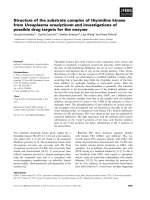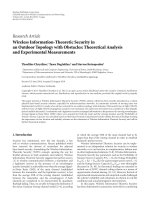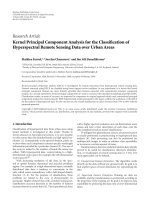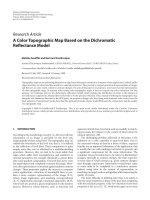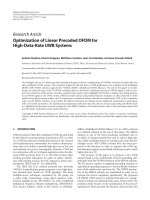SCIENTIFIC BASIC RESEARCH FOR ESTABLISHING DATA TOPOGRAPHIC MAP IN SERVICE OF MILITARY PURPOSE FROM GEOGRAPHICAL DATABASE AND REMOTE SENSING IMAGE
Bạn đang xem bản rút gọn của tài liệu. Xem và tải ngay bản đầy đủ của tài liệu tại đây (501.43 KB, 27 trang )
MINISTRY OF EDUCATION AND TRAINING
UNIVERSITY OF MINING AND GEOLOGY
NGUYEN THI LAN PHUONG
SCIENTIFIC BASIC RESEARCH FOR
ESTABLISHING DATA TOPOGRAPHIC MAP IN
SERVICE OF MILITARY PURPOSE FROM
GEOGRAPHICAL DATABASE AND REMOTE
SENSING IMAGE
Research field: Geodesy and Mapping
Code : 62520503
SUMMARY OF PHD THESIS
Hanoi – 2014
The thesis has been completed at Photogrammetry & Remote
Sensing Department, Faculty of Geodesy, University of Mining and
Geology, Hanoi
Full name of supervisors:
1. Assoc Prof. Dr Pham Vong Thanh
University of Mining and Geology
2. Dr Vu Van Chat
Defense Mapping Agency of Vietnam
Examiner 1: Assoc Prof. Dr Pham Quang Vinh
Institute of Geography, Vietnam Academy of Science
and Technology.
Examiner 2: Dr Đong Thi Bich Phuong
Vietnam Institute of Geodesy and Cartography,
Ministry of Natural Resources and Environment.
Examiner 3: Dr Bui Quang Thanh
University of Science, Vietnam National University,
Hanoi.
The thesis will be defended at the University examination Council at
the Hanoi university of Mining and Geology At… h, …/…/, 2014
This thesis can be referenced at the National Library or at the library
of the Hanoi University of Mining and Geology
INTRODUCTION
1. Urgency of the subject
In the history, paper maps used to have the role of
information database and means of communicating the information
as well. Nowadays, together with the development of applications of
digital mapping technology and Geographic Information System -
GIS, the management of data and presentation of mapping
information had clear division in physical term. As placing in a
spatial database administration system, database and map associate
together to form a united form.
In Vietnam at present, topographic map in general, topographic
map in service of military purpose in particular is basically established
from pure graphic software; therefore, there are many shortcomings
from presentation form to the management and application.
In fact, the majority of countries use national geographic
background database covering multi-purpose as original documentation
to derive into database for many different purposes. Therefore, it is
necessary to study the ability to organize mapping database in model
type in the military geographic background database and ability to
present the map from this database aimed at optimizing in managing,
exploiting and updating synchronously the data of entire system.
As building military map database from national geographic
background database, it is necessary to update, supplement military
geographic data not being available in national geographic
background database or having fluctuation over the time. In which,
remote sensing documentation is considered as one of the most
efficient channels for collecting geographic information because of
wide embracing sphere and quick information supply frequency.
2
2. Research purpose
The research purpose in theory is aimed at clarifying the scientific
background on building database of Vietnam military topographic map on
the basis of applying GIS technology, digital map and remote sensing. The
tests are implemented according to the proposed technical - technological
solution aimed at verifying again the studied theory basis.
3. Research object:
The research object is database of Vietnam military topographic
map scaled 1:10,000 to 1:50,000 in building, displaying and updating.
4. Scope of research
Scientific scope: the research sets up the structural model, process
of building, presenting and updating the military topographic map database
on the basis of sampling with scale 1:10,000, 1:25,000 and 1:50,000.
Geographic scope: the research focuses on specific topographic
types in the sphere of Vietnam territory having effect to military purpose
including: topography of mountain, delta and coastal delta, sea and island
region, urban type residential area, rural type residential area.
5. Research content
* Theory: Researching, establishing scientific background for
completing structure of geographic background database aimed at
ensuring the function of topographic map database. Researching
scientific background for building and presenting military topographic
map from geographic background database. Researching scientific
background for extracting military geographic data from remote
sensing image for the purpose of updating database.
* Testing: Testing the building of generalization tools, Set of map
presentation rules and verifying by building database samples and
presenting the map for specific topographic types (topography of rural
residential area, urban residential area, mountainous, coastal areas, and
sea and island) and summary sample (01 piece of map) according to the
3
proposed process. Testing the decipher and extraction of geographic
object by remote sensing image documentation (VNREDSat-1, SPOT5)
for the purpose of updating database. Testing the management, sharing
of database by building special-purposed software.
6. Research method: 1) Method of inheriting, researching documentation;
2) Mapping method; 3) GIS method; 4) Remote sensing method.
7. Scientific and reality significance of the dissertation
* Scientific significance of the dissertation: The researches presented in
the dissertation contributed to agreeing the scientific background in
building military topographic map database according to GIS technology,
digital map and remote sensing, suitable for actual condition of the major
of Vietnam military Topography. The researches also affirm that updating
military geographic object from remote sensing image in combination
with other documentation sources for military topographic map database
is indispensable. The contributions of dissertation in theory and testing can
be used as basis for developing product types of topographic map database
according to different purposes.
* Reality significance of the dissertation: Research results are the
basis for converting the model of establishing Vietnam military
topographic map from technology applying graphic software into
GIS technology. The principles of selecting, using remote sensing
image documentation, applying the decipher method in combination
with object classification from remote sensing image to ensure the
accuracy, reliability and suitability for the purpose of updating
military geographic data for military topographic map database.
8. Defense theoretical points of the dissertation
Theoretical point 1: Military topographic map database can
be organized in the types of model in the Military geographic
background database on the basis of supplementing data structure,
building generalization model and presenting the map to ensure the
4
quality of original data.
Theoretical point 2: Military geographic objects can be
updated directly into the military topographic map database as
combining between the knowledge of deciphering military target and
technique of processing digital image.
9. New points of the dissertation
1. Establishing the scientific background on model of database
structure of Vietnam military topographic map on the basis of
supplementing the structure for Military geographic background database.
2. Building the solution system of building military
topographic map database of various scales by generalization tools
according to automatic operation chain as building derived database,
Set of automatic presentation rules in editing military topographic
map and process of extracting geographic object from remote sensing
image for the purpose of updating.
3. Building the software for managing, sharing data of military
topographic map, contributing to supporting the efficient exploitation of
topographic information, expanding to many different objects having
knowledge about information and technology in the army.
10. Structure of the dissertation
Structure of the dissertation includes 4 chapters, presented in
150 pages. In which the writing part includes 121 pages, 62 figures
and diagrams, 13 tables.
CHAPTER 1. OVERVIEW ON RESEARCH SITUATION
BUILDING AND UPDATING DATABASE OF TOPOGRAPHIC
MAP IN THE COUNTRY AND IN THE WORLD
1.1. Situation of building mapping database
1.1.1. Real situation of building mapping database
* In the world: Strategic objective of many mapping organizations in
the world at present and in the future is to build an unique jointly used
5
database (landscape model having the highest accuracy) in order to
extract automatically the digital map products. However, this thing
exceeds the ability of existing technology because it is required to solve
concurrently the requirements on data generalization and presentation.
Therefore, in fact, people chose more simple solution that is to build the
database in service of presenting the map (extracting from geographic
background database by method of map generalization) with scale
corresponding to the scale system of the map to be formed. With the
way of organizing the data as above, in fact, there is shortcoming
about information synchrony in the system because of the reason that
the volume of updating work is too big, it must be implemented
concurrently for all database and according to two different
generalization methods. On the other hand, due to the use demand,
mapping database is updated regularly, thus the data is often newer
than geographic background database [41], [48], [58], [59].
* In the country: National geographic background database
(manufactured at Department of Survey and Mapping Vietnam - Ministry
of Natural Resources and Environment) has been being completed. The
system of national topographic maps of various scales is established
according to software MicroStation, with the model of file database.
Military geographic background database (manufactured at
Defense Mapping Agency of Vietnam (DMAV) - General Staff) is
built from original map. The system of military geographic maps
includes the scales from 1:10,000 to 1:1,000,000, is established on
the background of graphic software MicroStation.
1.1.2. Application of technology in building database and
establishing the map: including the technology of establishing digital
map and GIS technology: 1) Technology of building the model of
database structure; 2) Technology of building database.
6
1.1.3. Researches on building database and presenting the map
* Researches on generalization:
- Database is built according to multi-presentation model: 1)
The object is abstracted at different levels and created the association
among these levels; 2) Building the association among independent
databases, database at big scale used to extract databases at smaller
scale by generalization solutions (being applied more successfully).
- Generalization of data on the aspect of abstracting detail
level is analyzed on the basis of 12 basic activities and six cases
require implementing generalization operation namely: overlapping,
integration, conflict (crossing, contact and integration), change, non-
unification and exaggeration [61]. Generalization algorithms, tools
and software are built according to object feature to improve the
automation ability [23], [41], [51], [61], [62], [65], [68].
* Researches on map presentation: were summarized by the
scientists according to basic solution groups such as: displacement,
creation of mask effect and change of necessary sign dimension (to
solve the sign conflicts as presenting the map). Especially, the
scientists of Esri firm (America) researched successfully the
technique of displaying representative sign according to the
presentation principles designed in advance [59], [65], [68].
1.2. Situation of updating database from remote sensing image
1.2.1. Actual situation of updating database from remote sensing image
As deciphering by eyes, geographic object is often digitalized and
attached information on the basis of referring old data. For the method of
treating digital image, object of extracting image directly is updated into
database on the basis of combining expert knowledge and image analysis,
treatment system. The extraction of fluctuation data from multi-time image
only has supporting nature [10], [26] 42], [43], [48], [52], [53], [54], [55].
7
1.2.2. Application of remote sensing technology for purpose of
updating database.
1.2.3. Research works for purpose of updating database from
remote sensing image
Methods of extracting geographic object from remote sensing
image which is researched successfully basically focus on the object
of optical remote sensing image with dissolution < 1m separately or
in combination with Lidar data, using Markov order model
algorithm, GIS method [42], [43], [45], [49], [53], [54], [55].
1.3. Managing and sharing military data
1.4. Issues to be solved in the dissertation
Researching the basis to supplement data structure for
geographic background database suitable for purposes of generalization
and presentation of map. Analyzing the effect factors and purpose
activities according to object feature in building extraction database in
order to propose suitable technology solution. Scientific basis on
presenting the map from database with the objective of not affecting to
the quality of original data is considered on the basis of combining the
technique of extracting the information and displaying digital map. Basis
of applying the method of classifying object, military geographic object
group from remote sensing image and principles on selecting, using
documentation above for the purpose of updating database. Using
special-purposed software for managing, sharing and exploiting
geographic map database to expand to use objects in the military field.
CHAPTER 2. THEORETICAL BACKGROUND FOR
BUILDING MILITARY TOPOGRAPHIC MAP DATABASE
2.1. Concept of military topographic map database of Vietnam
2.1.1. Military topographic map
2.1.2. Military topographic map database
2.2. Generalizing background theory in building and updating map database
8
2.2.1. Digital map
2.2.2. Building map database
2.2.3. Updating database by remote sensing image
2.3. Building database
2.3.1. Factors affecting to the building of map data
General theory factors: Map scale; Special subject content and
map type; Feature of object to be reflected; Territory geography feature;
Documentation condition; Presentation [22], [31], [37]. New factors
appear due to the effect of technology: 1) Spatial resolution; 2)
Spatial relationship among objects; 3) Information extraction
method; 4) Data enrichment.
2.3.2. Data generalization
Including the related research contents such as: concept of
generalization, generalization of object data without network type,
generalization of object data with network type, generalization of
attribute data, scale calculation in data generalization, method of
evaluating accuracy of data generalization.
Figure 2-4. Proposed generalization model
Table 2-2. Classification of data generalization with network type
9
2.3.3. Map presentation
Including the related research contents such as: generalization
of object data without network type, generalization of object data
with network type, scale calculation in data generalization, principle
of map presentation from database, method of evaluating accuracy of
map presentation from database.
Table 2-3. Classification of generalization activities in editing the map
2.3.4. Structural model of database
- Structural model
- Principle of building criteria of receiving geographic objects
2.4. Updating database by remote sensing image
2.4.1. Factors affecting to ability to decode and classify
- Effect of some natural factors to spectral reflection feature.
- Spectral reflection feature of some natural objects.
- Spectral reflection feature of some manmade objects.
- Structural feature of some objects.
- Feature of military geographic object.
2.4.2. Knowledge basis for supporting the deciphering of military
target: solving the basis for deciphering military geographic objects
and knowledge basis for supporting the deciphering of military target
2.4.3. Treating digital image
- Technique of treating digital image: including 7 main
groups namely: 1) Changing, correcting image; 2) Strengthening
image quality; 3) Extracting information; 4) Classifying image; 5)
Adjusting image; 6) Mixing image [25], [37].
10
- Selecting the sampling method: identifying according to
spatial sample (classifying image by eyes and supporting the
treatment of digital image), identifying according to time sample and
spectral sample (using in the method of treating digital image).
* Evaluating the accuracy of geographic object after classification
Geographic object extracted from image must be checked
again the information at field to ensure the accuracy and reliability.
* Discovering fluctuation
It is possible to use the method of researching remote
sensing, GIS or combining between remote sensing and GIS to
support the deciphering process.
2.4.4. Principle of selecting and using remote sensing documentation
* Principle of selecting documentation: depending on
research object. As deciphering, it is necessary to combine both
factors of reflection spectrum and spatial resolution. Short repetition
receipt cycle is also factor for evaluating the ability to supply
information quickly for updating.
* Principle of using documentation: it is noted that in special case,
the requirement on new information factor is placed on top position.
Conclusion of chapter 2
In theoretical term, scientific background for map database can be
identified on geographic background database based on the researches on
structural model, data generalization and map presentation of various
scales from the database. Besides, the updating, supplementation of
military geographic data from optical remote sensing image can be based
on the methods of deciphering image and treating digital image in
combination with knowledge of deciphering military target.
11
CHAPTER 3. TECHNICAL – TECHNOLOGICAL SOLUTION OF
BUILDING MILITARY TOPOGRAPHIC MAP DATABASE
3.1. Technology selection: ArcGIS software set used for building, updating
database and presenting the map, ENVI 5.0 used for treating digital image.
3.2. Technology process
Figure 3-1. Diagram of technology process for building military
topographic map database
3.3. Data conversion, normalization and supplementation of
information structure
12
3.3.1. Data conversion
3.3.2. Data normalization
3.3.3. Supplementation of information structure, data enrichment
3.4. Generalization in building derived database
3.4.1. Generalized operations sequence analysis
Figure 3-2. Operations sequence analysis diagram in building derived database
3.4.2. Generalization by discrete method
Figure 3-3. Generalized operation diagram by discrete method
3.4.3. Generalization by synthetic interaction method
Figure 3-5. Generalized operation diagram by synthetic interaction method
13
3.5. Map presentation of scales
Figure 3-7. Presentation diagram of military topographic map from database
3.6. Set of automatic presentation rules
3.6.1. Basis for building Set of automatic presentation rules
Figure 3-8. Conceptual diagram of Presentation technique
Figure 3-9. Conceptual diagram of Presentation indicator
Figure 3-10. Conceptual diagram of Presentation list
14
Figure 3-11. Conceptual diagram of Map presentation
3.6.2. Building Set of automatic presentation rules
Set of automatic presentation rules includes: numeric symbol set,
set of automatic symbol presentation rules and presentation samples.
Figure 3-12. Diagram of procedures for building set of automatic presentation rules
3.7. Updating database by remote sensing image
3.7.1. Technological process
Figure 3-13. Diagram of technological process updating geographic
object from remote sensing image
15
3.7.2. Set orthogonal image
3.7.3. Separating object
Figure 3-15. Diagram of procedure for separating geographic object
from remote sensing image
Selection of applied algorithm: 1) Object class classification
algorithm; 2) Object-oriented classification algorithm; 3) Calculation
of mean value of reflective spectrum layers; 4) Object vectorization
from image; 5) Data simplification after vectorization.
3.7.4. Deciphering image
3.8. Building database management, sharing and exploiting
software of military topographic map
3.8.1. Purpose of building
3.8.2. System design
3.8.3. Functions of software
Conclusion of chapter 3
This database is designed in the form of model in the geographic
background database by supplementing data structure. The automatic
generalization tools are built on the basis of applying the proposed theory and
exploiting the facility features of ArcGIS software. The map presentation
technique is divided into two cases for the direct information exploitation
numeric map from the screen and printing on paper (not affect the original
database. The image deciphering procedure and digital image processing
procedure (by object-oriented classification method in combination with
classification under the combination image sample or reflective spectrum
16
sample on remote sensing image) is the basis for separating the military
geographic object to serve the database update. The solution for building the
database management, sharing software of military topographic map is the basis
for expanding the exploitation, using object for military purpose.
CHAPTER 4. TESTING TECHNICAL – TECHNOLOGICAL
SOLUTION FOR BUILDING AND UPDATING DATABASE
OF MILITARY TOPOGRAPHIC MAP
4.1. Building automatic generalization tool of database with
scales 1:25,000, 1:50,000 from database with scale 1:10,000
4.1.1. Building generalization tool by discrete method: The test
result includes 50 tools, in which: Aquatic system 20, Topography 3,
Traffic 12, Population and infrastructure 10, Military 1, Border and
boundary 3, Surface covering 1.
4.1.2. Building generalization tool by synthetic interaction method
Building the automatic generalization operations sequences
for the objects without geometric change.Building the preprocessing
operations sequences (only include the operations such as selection and
rejection, aggregation) for the objects with geometric change after
generalization. Generalizing simultaneously the objects on the basis
of line simplification operation, except for the objects that need to be
preserved the level of abstraction. The test result includes 44 tools, in
which: Aquatic system 16, Topography 3, Traffic 12, Population and
infrastructure 10, Military 1, Surface covering 2.
* Evaluation of test result: the discrete generalization tools
have the advantage of shorter implementation time, suitable for the
areas with the homologous topographic characteristic. The
generalization tools have the slower processing speed, suitable for the
areas with the complicated, interleaved topographic characteristic.
The scales are different but the list of objects is not changed, apply
the operations sequences by changing the parameter corresponding to
17
the scale to be built. For the models with change in list of objects and
list of attributes, must supplement the conceptual generalization
operation and reclassification on the basis of filtering by attribute.
4.2. Building Set of military topographic map presentation rules
with scale 1:10,000, 1:25,000 and 1:50,000 from the military
geographic background database with scale 1:10,000
4.2.1. Numeric symbol set
Table 4-1. Test result of symbol set with scales 1:10,000, 1:25,000 and 1:50,000
4.2.2. Set of automatic presentation rules
Table 4-2. Statistics of test results of designing set of automatic
presentation rules
4.2.3. Automatic presentation form
The presentation form contains display object information
(vector, note) and display order of precedence. The information
structure includes 3 subjects: 1) Main content: 81 layers; 2) Frame
and none-frame explanation: 14 layers; 3) Note of main content:
contain attribute information separation result.
* Evaluation of test result: the set of test automatic presentation
rules includes the presentation form, Numeric symbol set and set of
automatic presentation rules for the military topographic map with
scale 1:10,000, 1:25,000 and 1:50,000. This is also the basis for
developing the Set of military topographic map presentation rules for
18
smaller scales. May develop the Set of presentation rules for the other
map product forms.
4.3. Building database and map presentation forms for specific
topographic forms
* Building database with scales 1:10,000, 1:25,000 and 1:50,000:
Data of separated, converted and normalized areas under the
designed geographic background frame for scale 1:10,000. From this
database, apply the generalization tools to derive to the geographic
background database with scale 1:25,000 and 1:50,000.
* Map presentation with scales 1:10,000, 1:25,000 and 1:50,000:
Use the Set of automatic presentation rules for presenting the map
from database with scale corresponding to the scale necessary for
establishing the above map and method of map derivation with
smaller scales from the map with larger scale.
4.4. Separating geographic object from VNREDSAT-1
The used document is the set image product, intensify the spatial
resolution (2.5m) at the Defense Mapping Agency of Vietnam – General
Staff. In which, original satellite image (received on 15/9/2013), Version
V1 S 1319; Coordinate system WGS 84, UTM projection, zone 49;
Resolution 2.5m for panchromatic image, 10m for multi-spectrum image.
4.4.1. Separating object, object class by image of Red-Green-Blue
combination
Select object segmentation value 75%. Select aggregation
value of object segmentations 70%. Use different imaging function of
vegetation index [25]:
NDVI = (DNRed - DNGreen)/(DNRed + DNGreen + eps) (4.1)
In which, DNRed, DNGreen respectively are the brightness
value of image pixel on Red and Green channel; eps is a small value
to avoid denominator equal to 0.
19
From the different image of vegetation index, it shows that
cool corrugated iron roof object has the value very close to the yard
or traffic road object. Therefore, the object-oriented classification in
combination with classification by image sample is only good for the
roof object without corrugated iron, surface water and vegetation.
The other objects must be in combination with visual deciphering.
4.4.2. Separating object, object class by image of Para- infrared-
Red-Blue combination
Select object segmentation value 85%, aggregation value of object
segmentations 70%, because these parameters ensure the full object
separation. Use different imaging function of vegetation index [25]:
NDVI = (DNNir - DNRed)/(DNNir + DNRed + eps) (4.2)
In which, DNNir, DNRed respectively are the brightness
value of image pixel on Para-infrared and Red channel; eps is a small
value to avoid denominator equal to 0.
4.4.3. Separating object by Green channel
Select object segmentation value 40%, aggregation value of object
segmentations 80%, because these parameters ensure the full object separation.
4.4.4. Separating object by Para- infrared channel
Select object segmentation value 85%, aggregation value of
object segmentations 80%.
* Conclusion:
- The roof, traffic road, vegetation, unoccupied land, boundary
between some areas may be separated by digital processing method.
- If the study area is basically homologous in the characteristic
of object needed to be separated, the object-oriented classification by
Para-infrared channel and selection of simultaneous separation of objects
ensure the spatial accuracy better than all others). And for the area with
complicated geographic object characteristic, should combine the
application of object group classification on the basis of sampling on
20
different image of vegetation index (when the spectrum reflection of
contiguous objects is distinguished distinctly).
- The vector data after separating from image must implement the
generalization activities according to the reception criteria of each
geographic object before synchronization into database.
- The parameters used for separating data are selected
depending on spectrum reflection characteristic and structure of
object in each specific case.
- When taking change sample, it is necessary to select the image
polarization limit value in order to ensure that it does not filter the object.
4.5. Synthetic test of solutions for an area
The used document is the national geographic background
database with scale 1:10,000 (2012) of the Ministry of Natural
Resources and Environment. The received satellite image SPOT5
(2013) has good image quality, without cloud. Defense land database
(2013), digital model of resolution 30m and change detecting
document (2013) of the Defense Mapping Agency of Vietnam.
* Building database: The spatial change objects according to the
reception criteria are converted into the respective geometric form
fully. The application of automation support tool in establishing data is
a suitable solution. In which, the synthetic interaction generalization
model has advantage of decrease in workload dealing with spatial
conflict when the topographic characteristic is diversified.
* Updating geographic information from satellite image SPOT5:
The military geographic objects not included in the national geographic
background database or newly appear are decoded visually, digitalizing
and assigning attribute information according to each object on the basis
of referring digital data with image background, defense land database.
The change objects concentrate mainly on vegetation covering layer
object, some traffic lines and population and infrastructure. The image
21
deciphering key is built in the same geographic area, it supports
effectively when deciphering the object from image.
* Map presentation: The map is presented on the basis of using Set
of automatic presentation rules of geographic background database
with scale 1:25,000. The data of military zone is updated and saved
in the database but not printed on paper map. Through the statistics
of automation object data presenting the test map product, it shows
that the capacity of editing digital map is up to 90%; and the editing
of paper printed service map reaches about 60% - 80%.
* Evaluation of test result: the automatic map presentation system
ensures the technical requirements editing military topographic map
both in digital and paper forms.
4.6. Organizing map information content in the database management,
sharing and exploitation software of military topographic map
* Testing digital map presentation for exploiting direct information
from screen for military transport network data
* Testing military topographic map database integration
Integrate the military topographic map database with scale
1:10,000 (Da Nang City), 1:25,000 (Tan Bien), 1:50,000 (Hoa Binh)
into the map display system. Integrate satellite images QuickBird with
resolution of 0.6m (Da Nang city) and Landsat covering territory,
resolution 30m exploited from Internet network; SPOT5 (Tan Bien area)
and VNREDSat-1 (Da Nang city) with resolution of 2.5m. Integrate map
presentation form in the form of printing editing and electronic map to
exploit the automatic map presentation feature of the software.
Conclusion of chapter 4
The military topographic map database has enough capacity to
develop the modern map forms, at the same time it is favorable in
updating system information. The automatic generalization tools for
building data, and the Set of automatic presentation rules using the
22
purpose of presentation, editing military topographic map meets the
requirements on building military topographic map database. The
visual deciphering of military geographic objects ensures the technical
requirements updating database. Separation technique of object, object
class from the remote sensing image has the role in supporting spatial
data separation. The data display organization test in the self-
established specialized software ensures the requirements on
managing, sharing data at the grassroots levels, suitable with the
information exploitation capacity for the users at many different levels.
CONCLUSION AND RECOMMENDATION
Conclusion
1. The military topographic map database is organized in the form
of model in military geographic background database on the basis of
supplementing data structure. The military topographic map data is also
separated into an independent database, or converted into the different
formats according to the international standard, when installing on the
modern military equipment. This can ensure the optimization purpose in
managing, exploiting and updating data in the whole system, may be
called collectively military topographic database.
2. The automatic generalization tools by discrete generalization
method and synthetic interaction method support appropriately for
building the databases derived from the database with highest accuracy
and detail level. In which, the generalization by discrete method is suitable
with the areas of homologous topographic characteristic, and the
generalization by and synthetic interaction method is more suitable with
the areas of complicated topographic characteristic.
3. The Set of automatic map presentation rules is built on the
basis of map theory, database and application of GIS technology. The
Set of rules ensures the technical requirements on editing and
presenting military topographic map from military geographic
23
background database, when this database has been supplemented
with structure in accordance with the purpose of map presentation.
4. The digital image processing technique in combination
with expert knowledge in deciphering military geographic object,
especially military target ensures the data update directly from the
remote sensing image to the database. In which, some geographic
objects (such as vegetation, traffic, house, surface water) can be
separated from the remote sensing image with high resolution based
on the combination between object-oriented classification technique
and classification by spectrum reflection characteristic, with the best
obtained result is to use the Para-infrared channel. The attribute data
of military geographic object must be determined on the basis of
referring to original database, reliable documents, expert knowledge
in deciphering military target and need the field survey.
5. The exploitation of preeminent features of software
packages ArcGIS, ENVI is in accordance with the purpose of building
and updating military topographic map database, as well as investment
capacity in human, equipment of the Vietnamese Army at present.
Besides, the solution for building software to serve the topographic
map database information management, exploiting and sharing can
satisfy the actual use requirements for the users widely in the army.
6. The topographic map database that is built according to the
above model can be used for developing the modern map product
forms (such as 3D map, network map, multimedia map ), in order to
meet optimally the consultation work and topographic assurance.
Recommendation
1. Within the scope of research of the theme, only carry out
test for 03 scales of the military geographic background database
system including 1:10,000, 1:25,000 and 1:50,000. This model needs
to be continued testing for the remaining scales in the database




